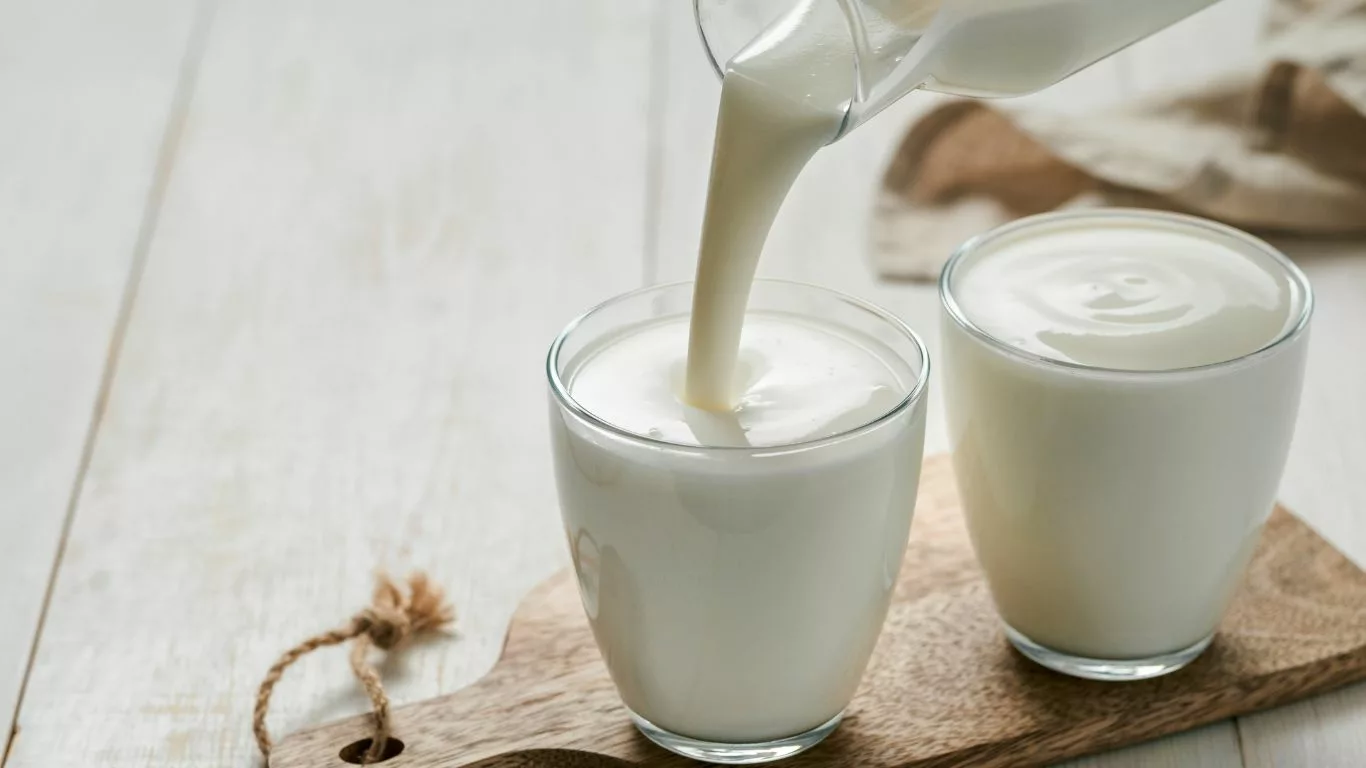Is Kefir Good for Acid Reflux: A Gut-Healthy Approach
Explore the potential of kefir as a natural remedy for acid reflux relief and digestive wellness. Learn about its benefits, usage, and considerations in this comprehensive guide.
Acid reflux, characterized by a burning sensation in the chest and throat, is a common digestive disorder affecting millions worldwide. While medications offer relief, many seek natural alternatives for long-term management. One such remedy gaining attention is kefir, a fermented dairy product celebrated for its probiotic content. In this article, we’ll delve into the relationship between kefir and acid reflux, exploring its potential benefits, usage, and considerations.
Understanding Kefir
Kefir originates from the Caucasus Mountains and is traditionally made by fermenting milk with kefir grains, a combination of bacteria and yeast. This fermentation process produces a tangy, yogurt-like beverage teeming with probiotics, live microorganisms known to confer health benefits when consumed in adequate amounts.
Probiotics play a crucial role in gut health, aiding digestion, supporting immune function, and maintaining a balanced microbial environment in the intestines. Kefir’s rich probiotic profile makes it a popular choice for promoting digestive wellness.

Benefits of Kefir for Acid Reflux
The consumption of kefir may offer several potential benefits for individuals with acid reflux:
Probiotic Support
Kefir is packed with a diverse array of probiotic strains, including lactobacilli and bifidobacteria, which populate the gut and promote a healthy microbial balance. By enhancing gut flora, kefir may help alleviate digestive issues, including acid reflux.
These beneficial bacteria contribute to the breakdown of food, inhibit the growth of harmful pathogens, and strengthen the intestinal barrier, reducing the likelihood of reflux-inducing inflammation.
Anti-Inflammatory Properties
Chronic inflammation is implicated in the development and exacerbation of acid reflux. Kefir contains bioactive compounds, such as peptides and polysaccharides, with anti-inflammatory properties that may mitigate inflammation in the gastrointestinal tract.
Reducing inflammation can help alleviate symptoms of acid reflux and protect against complications associated with prolonged inflammation, such as esophageal damage and Barrett’s esophagus.
Improved Digestive Function
A healthy digestive system is better equipped to handle the challenges posed by acid reflux. Kefir promotes optimal digestive function by enhancing nutrient absorption, regulating bowel movements, and promoting regularity.
By supporting efficient digestion, kefir may reduce the occurrence and severity of acid reflux episodes, providing relief to those struggling with gastrointestinal discomfort.

Usage and Considerations
Incorporating kefir into your diet can be a simple and enjoyable way to support digestive health and potentially alleviate acid reflux symptoms. Consider the following tips for incorporating kefir into your routine:
Choose Quality Sources
Opt for organic, plain kefir with live and active cultures to maximize its probiotic content and health benefits. Avoid flavored varieties with added sugars, as excessive sugar intake can exacerbate acid reflux symptoms.
Start Slowly
If you’re new to kefir, introduce it gradually into your diet to allow your body time to adjust to the probiotic influx. Begin with small servings and gradually increase consumption as tolerated.
Monitor Your Response
Pay attention to how your body responds to kefir consumption. While many individuals experience improved digestive function and symptom relief, others may notice adverse effects, such as bloating or gas. Adjust your intake accordingly based on your individual tolerance and preferences.
Combine with Other Lifestyle Changes
While kefir can be a valuable addition to your acid reflux management plan, it’s essential to address other contributing factors, such as dietary triggers and lifestyle habits. Incorporate kefir into a holistic approach that includes dietary modifications, stress management techniques, and regular exercise for comprehensive symptom relief.

Conclusion
In conclusion, kefir holds promise as a natural remedy for acid reflux relief and digestive wellness. Its probiotic-rich composition, anti-inflammatory properties, and digestive benefits make it a valuable addition to a holistic approach to managing acid reflux.
However, individual responses to kefir may vary, and it’s essential to listen to your body and consult with a healthcare professional if you have any concerns or underlying health conditions. By incorporating kefir into a balanced diet and lifestyle, you can support your digestive health and potentially experience relief from acid reflux symptoms.
Appendices
References
For further reading on the benefits of kefir and its role in promoting digestive health, consider exploring the following resources:
- Holscher, H. D. (2017). Dietary fiber and prebiotics and the gastrointestinal microbiota. Gut Microbes, 8(2), 172–184. Read Article
- Marco, M. L., & Heeney, D. (2019). Fermentation by gut microbiota cultured in a simulator of the human intestinal microbial ecosystem is improved by a combination of prebiotics. ISME Journal, 13(2), 460–471. Read Article
- Parvez, S., Malik, K. A., Kang, S. A., & Kim, H. Y. (2006). Probiotics and their fermented food products are beneficial for health. Journal of Applied Microbiology, 100(6), 1171–1185. Read Article
Remember to consult with a healthcare professional before making any significant dietary changes, especially if you have underlying health conditions or concerns about potential interactions with medications or treatments. Your healthcare provider can offer personalized guidance based on your individual needs and circumstances.
FAQs
Here are some frequently asked questions about kefir and its potential role in managing acid reflux:
Is kefir suitable for individuals with lactose intolerance?
While kefir is fermented and contains less lactose than milk, it may still pose issues for individuals with severe lactose intolerance. Some individuals may tolerate kefir better than milk due to the fermentation process, which breaks down lactose to some extent. However, it’s essential to monitor your body’s response and consult with a healthcare professional if you experience discomfort or adverse effects.
How much kefir should I consume daily?
The recommended daily intake of kefir can vary depending on individual factors such as age, overall health, and dietary preferences. As a general guideline, starting with a small serving, such as 4 to 6 ounces per day, and gradually increasing intake as tolerated is advisable. It’s essential to listen to your body and adjust your consumption based on your individual response.
Can kefir cure acid reflux?
While kefir offers potential benefits for digestive health and may alleviate symptoms of acid reflux, it is not a cure for the condition. Acid reflux is a multifactorial disorder influenced by various factors such as diet, lifestyle, and underlying health conditions. Incorporating kefir into a balanced diet and lifestyle can support digestive wellness and potentially reduce the frequency and severity of acid reflux episodes, but it should be viewed as part of a comprehensive management plan rather than a standalone solution.
Related Table
Here’s a table summarizing key information about kefir consumption for managing acid reflux:
| Aspect | Considerations |
|---|---|
| Quality | Choose organic, plain kefir with live and active cultures to maximize probiotic content. |
| Starting Intake | Begin with small servings and gradually increase consumption as tolerated. |
| Monitoring Response | Pay attention to your body’s response and adjust intake based on individual tolerance and preferences. |
| Integration | Incorporate kefir into a balanced diet and lifestyle, complementing other acid reflux management strategies. |
Note: Consult with a healthcare professional before making significant dietary changes, especially if you have underlying health conditions or concerns about potential interactions with medications or treatments. Your healthcare provider can offer personalized guidance based on your individual needs and circumstances.
Disclaimer: The information provided in this article is for educational purposes only and should not be construed as medical advice. While kefir is generally considered safe for consumption, individual responses may vary. It is essential to consult with a healthcare professional before making significant dietary changes, especially if you have underlying health conditions or concerns. The authors and publishers of this article disclaim any liability for adverse effects resulting from the use of the information presented. Always prioritize your health and seek medical guidance when needed.

Camellia Wulansari is a dedicated Medical Assistant at a local clinic and a passionate health writer at Healthusias.com. With years of hands-on experience in patient care and a deep interest in preventive medicine, she bridges the gap between clinical knowledge and accessible health information. Camellia specializes in writing about digestive health, chronic conditions like GERD and hypertension, respiratory issues, and autoimmune diseases, aiming to empower readers with practical, easy-to-understand insights. When she’s not assisting patients or writing, you’ll find her enjoying quiet mornings with coffee and a medical journal in hand—or jamming to her favorite metal band, Lamb of God.







